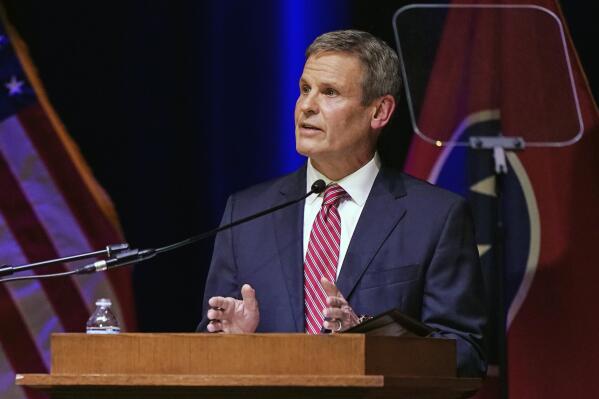AP News Guide: A look at Tennessee’s primary elections
NASHVILLE, Tenn. (AP) — Voters can begin casting ballots Friday in Tennessee’s Aug. 4 primary election as candidates compete to win their party’s nomination for governor, Congress and state legislative seats.
Some local counties will also have judicial elections, ballot initiatives and district attorney races.
Here’s a look at some of the top contests:
GOVERNOR
Republican Gov. Bill Lee is running unopposed in the GOP primary as he seeks a second term, marking the first time in nearly 30 years an incumbent governor has had no primary opponent. Meanwhile, three Democratic candidates are hoping to win their party’s nomination. Those three are physician Jason Martin, Memphis councilmember JB Smiley Jr. and community advocate Carnita Atwater.
While Tennessee has not elected a Democrat to statewide office in nearly 15 years, these three are hoping the current national political landscape and unhappiness among some voters over Lee’s first term will create a path for a Democrat to win the top seat.
CONGRESS
Earlier this year, Tennessee’s GOP-dominated General Assembly split up left-leaning Nashville into three congressional districts with the goal of flipping the seat from Democrat to Republican. This change sparked longtime incumbent Democratic U.S. House Rep. Jim Cooper to announce he would not seek reelection because he felt there was no path for him to win.
After some jockeying over who qualifies for the ballot, nine candidates are in the race. This includes Maury County Mayor Andy Ogles, former state House Speaker Beth Harwell, from Nashville, and retired Tennessee National Guard Brig. Gen. Kurt Winstead, of Franklin.
State Sen. Heidi Campbell from Nashville is the only candidate running in the Democratic primary.
Meanwhile, five out of Tennessee’s nine congressional members are running unopposed in the primary: U.S. House Reps. Diana Harshbarger, Tim Burchett, Scott DesJarlais, John Rose and Mark Green are all running unopposed.
Democratic Congressman Steve Cohen of Memphis, and Republican Congressmen David Kustoff and Chuck Fleischmann face opponents in the primary.
STATEHOUSE
In the Republican-supermajority Legislature, all of Tennessee’s 99 state House seats are up for election this year. There are currently 15 open seats, with the majority of them being held by Republicans. Twenty-one seats feature contested Republican primaries and nine include contested Democratic primaries.
Some of the openings include disgraced former House Speaker Glen Casada, who was ousted from the top position in 2019 due to a series of scandals. Former GOP Rep. Robin Smith resigned earlier this year after facing federal wire charges that allege she ran a political consulting kickback scheme with Casada and his former chief of staff, neither of whom have been charged to date.
Rep. David Byrd also won’t seek reelection. The Republican has faced allegations by three women of sexual misconduct three decades ago when he was a high school teacher and their basketball coach. He was never charged but two of the women accused Byrd of inappropriately touching them; the third said Byrd tried to.
Byrd initially announced he would retire in 2020, but reversed course by arguing that it was important to have an experienced lawmaker during the coronavirus pandemic.
Notably, long-serving state Rep. John Mark Windle has filed to run as an independent after previously being a registered Democrat for almost three decades.
In the Senate, 17 of 33 seats are on the ballot, four with contested GOP primaries and two with contested Democratic races. Three departing senators leave open seats: Republicans Brian Kelsey and Mike Bell, and Democrat Brenda Gilmore. Kelsey is facing a federal indictment on charges that he violated federal campaign finance laws during his failed 2016 congressional campaign.
Also up for election is a Shelby County seat that Democratic Sen. London Lamar of Memphis was appointed to fill after ex-Sen. Katrina Robinson was expelled from the Senate. Robinson, a Memphis Democrat, was convicted of using about $3,400 in federal grant money on wedding expenses instead of her nursing school. She was expelled before her sentence, which did not include prison time. Lamar faces two Democrats in the primary.
SUPREME COURT
All five seats on Tennessee’s Supreme Court are up for an eight-year retention election in the August primary. They are Jeff Bivins, Sarah Campbell, Sharon Lee, Holly Kirby and Roger Page. They are all expected to clear the vote.
OTHER KEY RACES
Tennessee’s most populous county, Shelby, features a couple of key races and a notable referendum.
County Mayor Lee Harris is being challenged by Memphis City Council member Worth Morgan. Harris, a Black Democrat, is seeking his second four-year term. Morgan, a white Republican, has served on the council since 2016.
Republican incumbent and longtime Shelby County District Attorney Amy Weirich, who has held the position since 2011, faces Democratic civil rights attorney and former county commissioner Steve Mulroy.
The pair have clashed in debates, and the issue of abortion prosecutions under the state’s pending “trigger law” has become an issue. The law essentially would ban all abortions statewide. It also would make performing an abortion a felony and subject doctors to up to 15 years in prison if convicted.
Mulroy said he would make prosecution of those who perform abortions an “extremely low” priority. Weirich has not said outright whether she will or won’t prosecute doctors who perform abortions. Weirich said it would be a violation of Tennessee code for her office “to issue a broad and hypothetical statement without an actual charge or case.”
Voters also will decide whether term limits for Memphis mayor and for city council should be extended from two to three. Memphis Mayor Jim Strickland has said he would seek a third term if the referendum passes.





